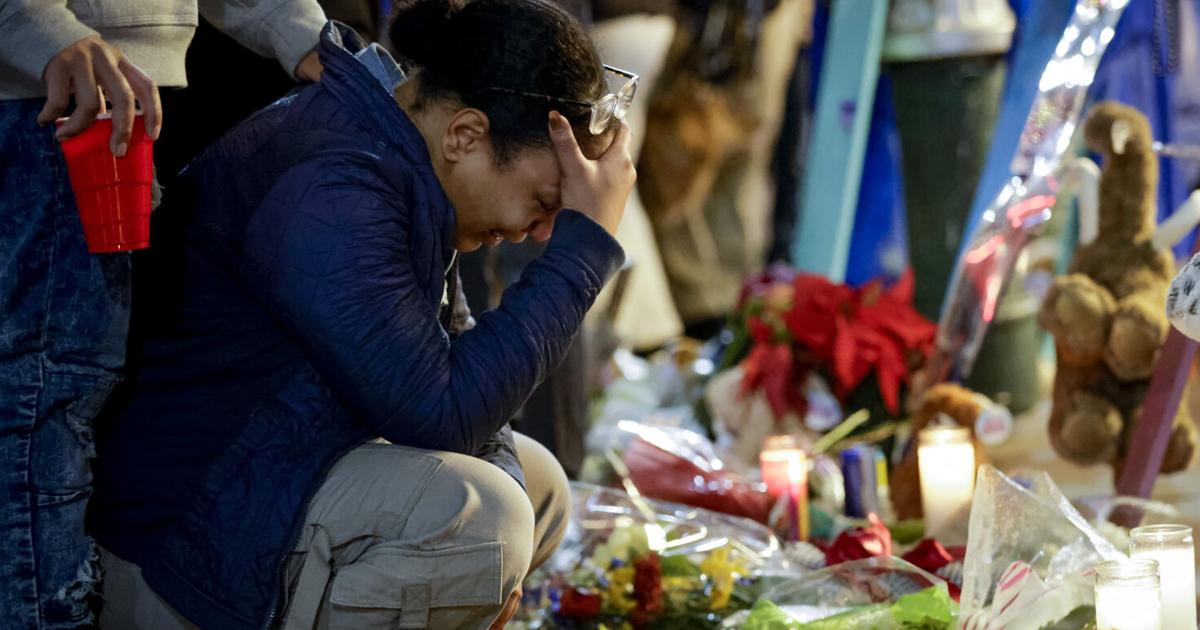On Saturday evening, family members mourned as they moved through a crowd of onlookers past a towering 10-foot crucifix adorned with flowers and tributes along Bourbon Street, the site of LaTasha Polk’s tragic death amidst chaos and terror. Just hours earlier, Polk’s family—brother Raynell Bates, aunt Kim Polk, and others—received the devastating news they had dreaded for four long days. LaTasha, a 47-year-old nursing assistant, was one of the casualties from a driver’s violent rampage on New Year’s Day on the nation’s most famous festive street.
Despite the heart-wrenching loss, family members felt that LaTasha would have wished the city to rejoice—not from fear, but with a sense of celebration, albeit laced with sorrow. A dedicated worker from New Orleans’ Treme neighborhood, Polk understood what many locals were saying this week: that dancing, singing, and embracing loved ones could help ease deep emotional wounds.
During a vigil honoring the 14 victims of last Wednesday’s attack, her family emphasized the kind of vibrant tribute that LaTasha would have appreciated. As a light drizzle fell from a grey sky, hundreds gathered on the first block of Bourbon Street. Music filled the air, with a brass band playing and a second line parade making its way through the crowd.
In the days leading up to the attack, residents had already endured significant hardship. They were reminded of the upcoming anniversary of Hurricane Katrina, which left lasting scars on the city twenty years ago. The devastating COVID-19 pandemic took many lives in 2020, while Hurricane Ida re-opened these old wounds the following year. A surge in violent crime—exacerbated by the pandemic—further highlighted the city’s struggles, alongside the ongoing issues of infrastructure decay, seasonal hurricanes, and an unreliable power grid.
However, there were cautious signs of recovery. City officials and first responders had achieved notable reductions in violent crime, and a recent University of New Orleans survey indicated that residents were starting to feel hopeful about the city’s future for the first time in years.
Tragedy struck in the early hours of New Year’s Day when Shamsud-Din Jabbar, a 42-year-old from Texas, drove a rented Ford F-150 onto the sidewalk, causing a devastating loss of life among revelers on Bourbon Street. The attack happened in mere seconds, yet its repercussions—beyond the 14 fatalities, over 30 individuals were injured—are expected to leave lasting effects on the community.
In a heartbreaking twist, LaTasha’s family continues to grapple with loss; her brother, Printisis Polk, who was with her the moment she died, remains unaccounted for, prompting the family to search local hospitals for him.
“We’ve contacted every hospital,” Bates lamented. “No one has any information.”
Despite the somber nature of the vigil, the lively atmosphere of the French Quarter was still palpable. Just hours after the attack, Bourbon Street was reopened, with street musicians and calls from strip club doormen enticing passersby. Meanwhile, someone shouting warnings of impending doom through a loudspeaker caught the attention of those nearby, some of whom stopped to witness the floral tributes and memorials dedicated to the victims.
The everyday bustle of Bourbon Street did not deter the families’ mourning. They found solace in being there together. Hubert Gauthreaux’s family, confirmed dead that day, wore Chicago White Sox hats in honor of their loved one.
Yet the grieving process has been complicated by the persistent presence of both local and national media, seeking to cover the aftermath of one of the deadliest attacks in recent U.S. history. Families have found it difficult to process their grief amidst the cameras.
“When we’re in deep sorrow, we don’t want to answer questions with cameras in our faces,” said Vanessa LeBlanc, Gauthreaux’s aunt.
Bates expressed remorse for not having called his sister more often before she passed. However, he refrained from blaming the city for the tragedy. “You could always blame the city,” he said, “but this was a premeditated act. This could have happened anywhere; you can’t prevent everything.”
As families gathered to remember their lost loved ones, the pain of grief was palpable, yet they also celebrated the vibrant lives lived amidst a community that continues to rally together in the face of adversity.
